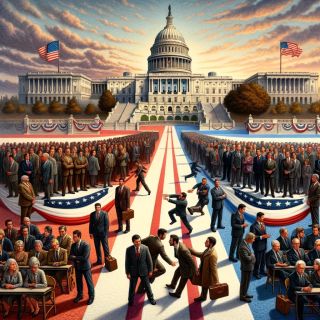Attachment
How Our Early Bonds May Explain Political Divides
Navigating group dynamics with attachment theory.
Updated February 26, 2024 Reviewed by Michelle Quirk
Key points
- Anxious attachment tends to lead to party conformity.
- Avoidant attachment may prompt political independence.
- Cultural context influences attachment and group dynamics.

Cowritten by Jon Gruda and Paul Hanges.
In American politics right now, things are really divided, making it super-hard for different sides to work together. But this isn't just about politics; it's something we all deal with in our own lives, too. Think about a time when you had to choose between sticking with your friends or doing what's best for everyone. It's a tough spot to be in, right?
Psychologists have a way of explaining how we deal with relationships, called "attachment theory." It means that how we acted as kids with our parents can affect how we act with others when we grow up. Some of us really need approval from others and get stressed out when we think we might not get it. Others like to keep things to themselves and handle stuff on their own. Politicians are no different. Some stick close to their party because they fear being left out or criticized. Others seem eager to violate their party’s norms and willingly reach across the aisle because they appear to be more about getting things done than fitting in. But look more closely at these individuals, and they are shaping joint deals to maximize their interests, not their party’s. Psychologists have identified a third “secure” group that successfully balances connections to their party by making deals with the other side.
In our recent study, we looked at more than 600 politicians and how they use Twitter to see if they're more about sticking with their group or open to working with others. Turns out, the ones who are scared of being left out (i.e., the anxious-attached) don't like to go against their party. But those who quickly disregard their party’s norms and expectations (i.e., the avoidant-attached) are more likely to work with everyone. Not surprisingly, the third group is in the middle (i.e., securely attached); they keep their connections with their group while striking out to form new partnerships.
This isn't just about them, though. In different places and cultures or with different groups of friends, there are unspoken rules about how to act. In some places, if you don't follow the rules, it's a big deal. But in others, people are cool with you doing your own thing as long as you don’t forget who your friends are. This is called cultural tightness/looseness. We find that politicians' representative state culture makes it easier or harder for them to work together, just as it can for the rest of us in our daily lives.
The key takeaway from all this is that understanding why we act the way we do, like why we stick to our groups or why we're scared to be different, can help us get along better. Whether it's in politics or our own lives, knowing more about how we relate to others can help us make better choices and understand each other better. It's all about finding a balance between being true to ourselves and being part of a group.
Paul Hanges is professor of psychology at the University of Maryland.
References
Gruda, D., Hanges, P., Mikneviciute, E., Karanatsiou, D., & Vakali, A. (2024). Every vote you make: Attachment and state culture predict bipartisanship in US Congress. Personality and Individual Differences, 222, 112576.


